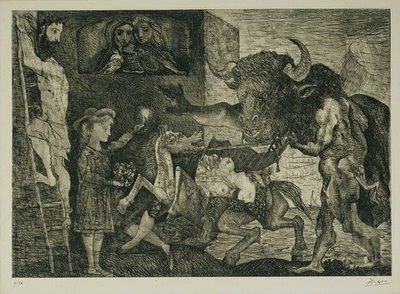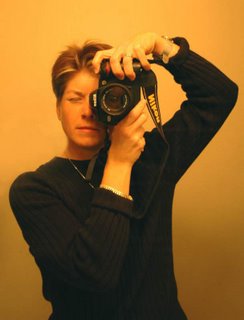the power of myth

"Man should not be in the service of society; society should be in the service of man. When man is in the service of society, you have a monster state... If you want to find out what it means to have a society without any rituals, read the New York Times." -- Joseph Campbell, as interviewed by Bill Moyers in "The Power of Myth"
Global warming.
Gas Prices.
HIV
Road rage.
New Orleans.
Iraq.
Hate crimes.
Police brutality.
Child pornography.
Obesity.
Bipolar Disorder.
Bureaucrasy.
Corporate feudalism.
Divorce rates.
Homelessness.
Zealotry.
Fundamentalism.
Bigotry.
Moral Bankruptcy.
-- a typical sampling of topics on current heavy rotation in the NY Times RSS feed. Monster state? Looks as if.
The rituals of modern daily life have become completely disengaged from any sort of central meaning. Instead of teaching a child how to weave a corn dolly from the last shock in order to preserve the spirit of the corn for next planting, we merely shuffle through the seats of the SUV for change to tip the barista. There's no connection between the little bits of paper and metal we trade for a drink at a shining chrome counter in Seattle, and the earth and sweat of the Guatemalan labourers who produced the beans necessary to make it. Most of the time we never even consider where coffee comes from, much less could we find it on a map or say anything accurate about the society that exists there. This severing of ties to the roots of origin essentially gives us a moral 'free pass' from responsibility. Why should we care that farmers in Latin America can make more money producing cocaine than coffee?
It doesn't affect us.
Children in modern American society are no longer actively taught idealism, symbolism or ritual. They are no longer widely encouraged to play, to imagine, to consider 'who are we?' and 'where did we come from'. Instead, they are sat in front of a little glowing box, given a dry set of facts to chase, and required to record datum on historical figures, distances between planets and the chemical makeup of a leaf. Rather than read Shakespeare's musings on toadstool faeries, they are asked to track down eight poisonous varieties of North American woodland mushroom, and write a two-page essay, due noon on Monday.
Students are measured by performance from the time they are five. Quantifiable standardised tests determine whether they are allowed to progress with their peers. Teachers are pressured to provide results. Schools are pressured to make the numbers meet expectations. Where in all of this data-gathering and struggle to achieve is the sheer overwhelming joy and wonder of simply being alive?
"Shakespeare said that art is a mirror held up to nature. And that’s what it is. The nature is your nature, and all of these wonderful poetic images of mythology are referring to something in you. When your mind is simply trapped by the image out there so that you never make the reference to yourself, you have misread the image." -- Joseph Campbell
Somewhere in the last century, the benevolent monarch Apollo was assassinated, his chariot overthrown, and raised in place was an enormous hydrogen bomb as totalitarian dictator. We are trapped behind an Iron Curtain of facts, and statistics have become the informers of our police state.
The power of myth is in storytelling. Storytelling with a basis in 'fairy tales' or 'fables' collected from the mythos of a thousand diverse societies helps to provide a basis of explanation of one's place in the world. It teaches understanding of other cultures and encourages a higher consciousness. Not necessarily organised religion, which has little relevance in today's society, but myth. Ghost stories. Fairy tales. Religious texts interpreted not as hard fact, but as historical 'ripping good yarns'. The power of myth and the need to understand our place in the cosmos explains the wild popularity of the Harry Potter novels and the Lord of the Rings movies. People have a central need to believe in the inherent 'rightness' of who they are and how they interact with the world at large. Lacking competent guidance, urban teenagers create their own mythos; i.e. street gangs, with their complex hierarchical structures and symbology. Myth is the lodestone that calibrates the moral compass of society.
Without this moral compass, one is rudderless, overwhelmed and lost on an increasingly stormy sea of anarchical values.

Minotauromachy -- Pablo Picasso (1935, etching)
The symbolism in this work of Picasso's is highly subjective. I find one can easily imagine in it Joseph Campbell's "monster state", the Minotaur figure (chaos, Armageddon). This monster has slain the "soldiers of logic" or "reason", (the matador and her horse), and the "philosopher" (the Christ-like figure on the left) is fleeing up the ladder. The 'audience' (background figures) look on from their tower with complete detachment; they are divorced of responsibility for what's going on. The only one here with the courage to face this terrifying monster head-on is the child (innocence) brandishing the flower (imagination / spirituality) as one might a weapon.
What strikes me most about this work of Picasso's is the detachment of the audience. These two figures in the tower, to me, represent the New Yorkers who will calmly ignore a crime taking place in broad daylight. They are the hit-and-run drivers, the colleagues of a battered wife, the social workers who place foster children in abusive homes.
It doesn't affect us.

"What destroys reason is passion. The principal passion of politics is greed." -- Joseph Campbell
LFR




